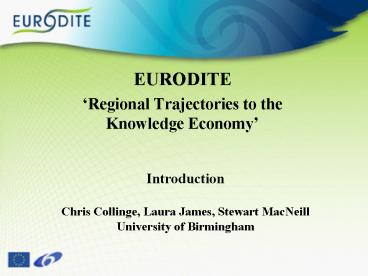Introduction Chris Collinge, Laura James, Stewart MacNeill University of Birmingham
1 / 11
Title: Introduction Chris Collinge, Laura James, Stewart MacNeill University of Birmingham
1
Introduction Chris Collinge, Laura James,
Stewart MacNeillUniversity of Birmingham
- EURODITE
- Regional Trajectories to the Knowledge Economy
2
Regional Trajectories to the Knowledge Economy
- EC Sixth Framework Programme
- Five years
- Budget of 4 millions
- 28 partners from 12 countries across Europe.
- Universities and RDAs
- Led by Centre for Urban and Regional Studies
University of Birmingham
3
The Lisbon Agenda
- Europe to become the most competitive and
dynamic knowledge based economy in the world,
capable of sustainable economic growth with more
jobs and better social cohesion. - Measures concerned with
- the information society,
- RD and innovation,
- internal market,
- improving the skills base
- modernising the European social model.
4
Project Approach
- The spatial organisation of economic activity is
fundamental to economic success - Regions are open systems, and so we must
understand trans-regional systems of innovation - Knowledge is crucial to innovation, and knowledge
concerns not only science and technology - Quantitative data must be illuminated by
qualitative research in order to understand
knowledge dynamics, and guide policy advice - A focus upon networks helps to explain the
origins of both innovation and enterprise
5
The Knowledge-based Economy
- Difficult to define all economic activity is
based upon knowledge - We can observe some changes that characterise
knowledge-based economies - Rapid technological change
- Knowledge that is traded as a product in its own
right - ICT offers a new means to store and transfer
knowledge - More knowledgeable workers, more knowledgeable
consumers - Knowledge management and governance
6
Innovation
- Defined as the exploitation of new ideas
- The driving force of the economy
- Schumpeter (1942)
- Rohmer (1986)
- Not a linear process from RD to exploitation but
depends on networks and exchanges amongst
different actors - firms, customers, suppliers, knowledge
institutions, public regulation bodies
7
Innovation and Knowledge
- In EURODITE we concentrate upon knowledge
- Knowledge is the feedstock of innovation
- Innovation networks transfer and share
knowledge - Firms produce knowledge, search for knowledge,
absorb knowledge and combine knowledge - Mix of internal and external processes
- Cumulative and combinatorial
- Mobile and anchored
8
(No Transcript)
9
Empirical Research
- Chosen case studies starting in regions
- Identified significant changes or trends in
economies in particular business sectors - Chosen firms that illustrate these trends
- Identified significant business changes
- Used a biography approach to trace the knowledge
networks involved in these business changes - Identified the actors and their roles and
locations regional to international
10
Knowledge Dynamics
- Efficient knowledge flow in the system depends
upon - The structure and effectiveness of the networks
- Upstream and downstream relations
- Knowledge types not just science and technology
- The surrounding environment
- The firm base same specialism, diversity,
competition - Knowledge base RD, Skills
- Regulations
- Policy to create conditions, address market
failure
11
Summary
- Overall goal is to assist policy makers to create
the conditions to enhance European economic
performance - Focus is on knowledge rather than innovation
whilst addressing the relationship between them - Today we present some initial outcomes and policy
implications discussion

